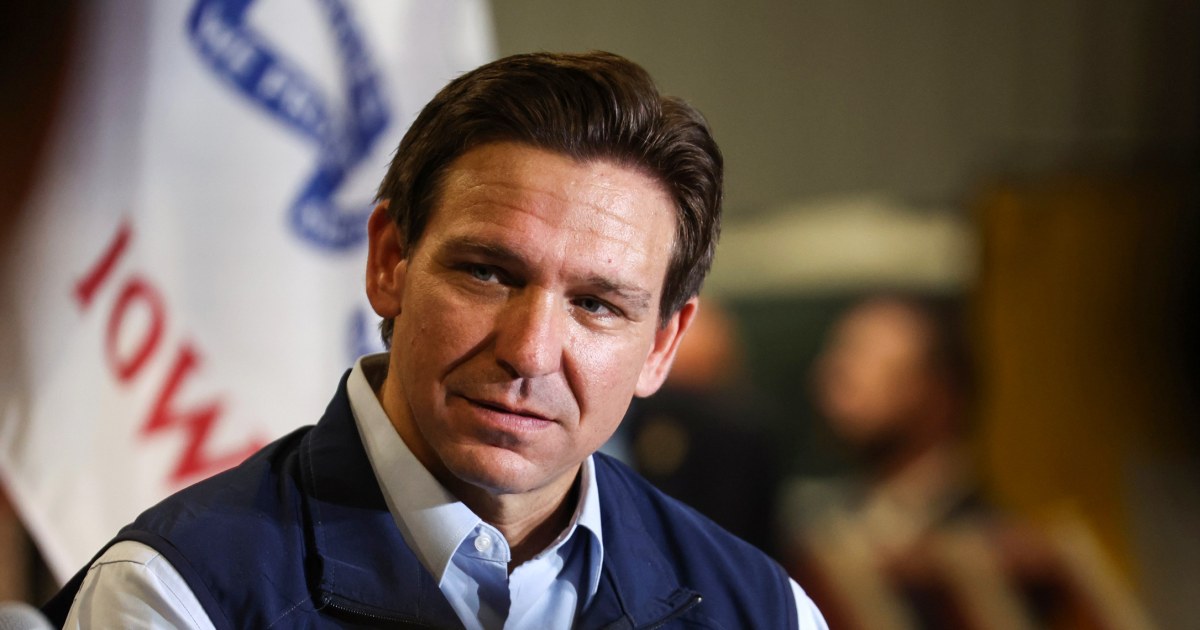
WEST DES MOINES, Iowa — Travier Craddock knocked on the door. He was ready to pitch his guy.
“Well, a little bit about [Ron] DeSantis,” he began. “Obviously, he’s a Republican candidate wanting to fight, and cut taxes. He’s a pro-life candidate. And he’s also fighting for the parents’ rights and the indoctrination that’s going on in schools. And, you know, he’s got a long history of like, elite education. He went to Yale and Harvard, worked his way through, was a JAG officer … and basically, we’re out here supporting [him] and want to know if you wanted [additional] information on him.”
But he wasn’t pitching a likely Iowa caucus-goer. He wasn’t even at a real door. Instead, he was working to develop the perfect pitch at a canvassing boot camp by the pro-DeSantis super PAC Never Back Down.
On Thursday, NBC News was offered a behind-the-scenes look at what the DeSantis allies have dubbed their “Fort Benning” — a nod to the military base in Georgia that provides basic training and was until recently named for a Confederate general — where door-knockers like Craddock are going through an eight-day “boot camp” learning everything there is to know about early-state canvassing and DeSantis himself.
At the training center, canvassers take classes, practice with pretend voters through a fake door at the center of the facility and run through all sorts of scenarios they could encounter out in the field. When one trainee was asked whether DeSantis favored cutting Medicare and Social Security, their fellow classmates chanted in unison when asked how to respond: “No change!”
Joe Williams, the senior field training director for Never Back Down, told Craddock that, considering it was only his second time practicing, “that was pretty doggone good.”
The DeSantis allies see this large-scale field program as the centerpiece in an effort to overtake former President Donald Trump, who holds a substantial edge over DeSantis in GOP primary polls but faces multiple indictments. In total, DeSantis’ backers plan to spend $100 million on this ground game spread over 18 states, laying the groundwork for the Florida governor to pick off delegates and win key battlegrounds.
So far, more than 260 canvassers have graduated from Never Back Down’s program, with door-knockers deployed to locations in Iowa, New Hampshire, South Carolina, Nevada and Super Tuesday states. As of Friday, Never Back Down’s team of canvassers has hit more than 235,000 households across the country, including about 83,000 in Iowa, 56,000 in New Hampshire and 76,000 in South Carolina since last month.
The goal, they say, is to have 2,600 trained canvassers by Labor Day.
“This is the most expansive, most in-depth, most cooperative, most intensive — fill in however many words you want to there that mean the same thing — program that I’ve ever seen,” Williams, who is also president of Vanguard Field Strategies, said. “It’s not even close.”
In training materials obtained by NBC News, DeSantis is described as having “a proven record of taking-on the left, the media and woke special interests,” while Trump is presented as President Joe Biden’s only shot at being re-elected.
“Ron DeSantis has the same fire as Trump, but he’s more disciplined and more effective at governing,” one slide reads. “Political rallies are meaningless if conservatives don’t get the job done. DeSantis gets the job done. Trump didn’t.”
The presentation contains additional criticism of Trump for not completing the border wall, reducing the national debt or “draining the swamp.” It also cites Trump-backed candidates being “annihilated in swing Senate and Congressional seats by Biden aligned candidates in 2022, even though Biden was terrifically unpopular.“ (DeSantis also backed many of those candidates.)
“Ron DeSantis is a tough, smart and proven campaigner,” the slide deck reads. “Trump is an unfocused, undisciplined candidate who will lose to Joe Biden, again.”
Chris LaCivita, a senior adviser to the Trump campaign, blasted the pro-DeSantis effort for “flooding Iowa with Californians and other out-of-staters to attack President Trump on the door steps of Iowa voters.”
“This tactic — though reflective of the candidate it’s meant to support — is gutless,” he continued. “It will backfire and render Rob DeSanctimonious a small footnote in the long list of losers who adopt Democrat tactics in their efforts to attack President Trump.”
Ryan Rhodes, an Iowa-based GOP operative unaffiliated with any presidential campaign, said a solid ground game in that early state can play a big role in how well a candidate performs. In a close race, he said, canvassers can make “the difference between first or fourth.”
For weeks, DeSantis’ allies have hyped their canvassing operation as their secret sauce to beat Trump, building out a proverbial army of early-state organizers to juice turnout, gather volunteers and collect data that will prove valuable to DeSantis’ nascent effort.
Putting canvassing front-and-center in a political operation is certainly not new, as Republicans in recent years have emphasized their total number of “voter contacts” through recent cycles. High-dollar donors have been willing to open their wallets to fund such efforts, which some see as offering greater returns than traditional TV or digital advertising.
But, as more than a dozen insiders with experience in GOP-aligned field operations in addition to internal data obtained by NBC News detailed, those large-scale conservative canvassing efforts have been plagued with issues including fraudulent and untrustworthy data entries, allegations of lax hiring practices and a lack of accountability.
Meanwhile, Vanguard Field Strategies, which has ties to the Never Back Down effort, is currently the target of a Nevada lawsuit alleging the firm “defrauded” the backers of a signature-gathering effort in the state. (A Vanguard representative told NBC News last month the lawsuit was merely an effort to garner attention and harm the company’s reputation.)
With such concerns in mind, Never Back Down said it has built such a structured training program to mitigate such issues as much as possible.
“What you see with the Never Back Down team is a very deep — as you saw firsthand — screening process to make sure folks … actually believe in and support the product they are selling,” David Polyansky, a senior adviser to Never Back Down, said.
“Traditionally in campaigns, there’s a big scramble for bodies, not necessarily cultural warriors,” he added. “But excitedly, we are seeing much more of that on our recruitment side … the people that we have recruited and trained are head and shoulders above the norm in both quality and passion. Much more so than anything that I’ve ever seen in the national political arena.”
Multiple Never Back Down officials said the emphasis for these canvassers is on quality interactions with voters rather than on how many households can be hit during a single shift — a metric that insiders told NBC News in earlier reporting can incentivize cheating or lead to more untrustworthy data. So far, Never Back Down said more than a quarter of their door knocks are leading to conversations with voters.
“So we are totally okay if they’re having long conversations with caucus goers if they’re answering questions, if they’re engaging with the husband and the wife, we’d much rather have them have a good conversation and fewer homes than … a bunch of homes with low quality,” Williams said.
Door-knockers themselves were impressed with how many resources the super PAC has put into training them and getting them prepared for the long campaign ahead.
Cynthia Williams, a pro-DeSantis door-knocker from Miami, said it was unlike other efforts she had been a part of.
“So they’re not just giving us a pamphlet and describing just like ‘hey, you’re reading this and just go off this,’” she said. “They want us to make a connection with those supporters when we go out there. And if we happen to meet somebody who’s on the opposite side, find out what exactly [they] want and let them know we’re still here.”
As Rhodes said, such training could make a big impact come this winter, when voters will be making their choices in the early states.
“The better you train those people, the better you track those people and make sure they’re doing real doors and having really good [conversations] can make the difference between winning or losing campaigns,” he said. “Especially in primaries.”
Source: | This article originally belongs to Nbcnews.com










